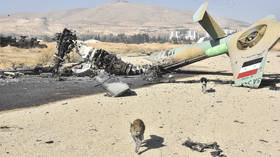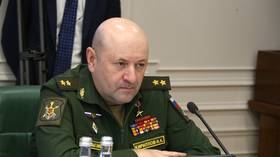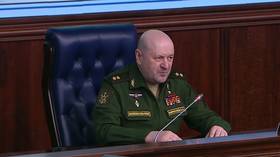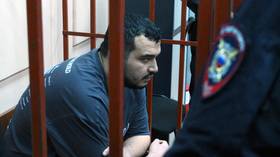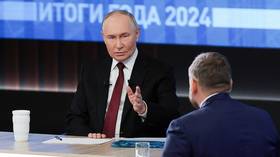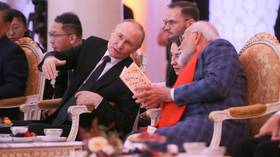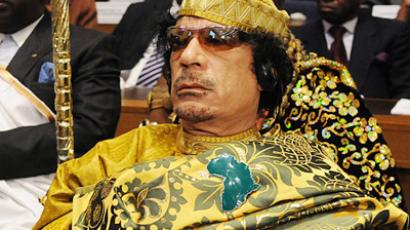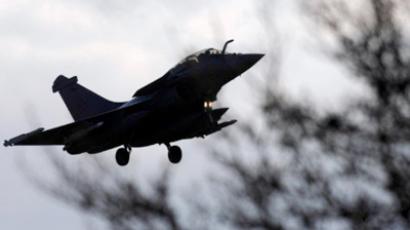Moscow cautiously optimistic on future Libyan relations
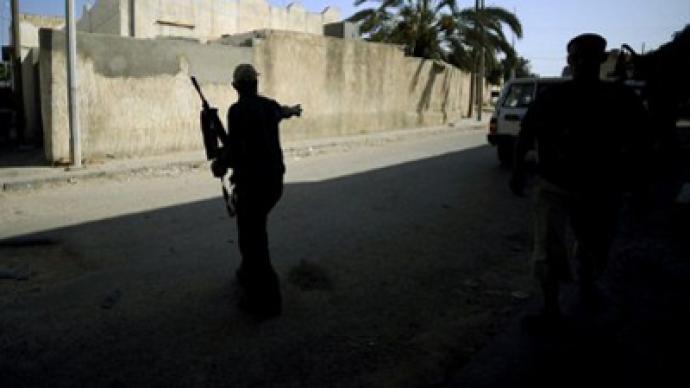
The Russian Ministry of Foreign Affairs said Moscow and Tripoli continue maintaining friendly relations, while Moscow stressed that it wanted guarantees on the safety of its foreign nationals residing in Libya.
"We have no reasons to doubt thus far that relations between the Russian and Libyan people rest on a solid footing of sincere friendship," Russian Foreign Minister Sergey Lavrov told reporters on Tuesday. Lavrov then stressed that the protection of Russian citizens inside of Libya is a priority for Moscow."The Libyan opposition will soon have to assume the responsibility for further developments in the country, while guarantees of foreign nationals' security, including Russian citizens, must become one of its priorities," Lavrov said at a news conference after talks with his El Salvadoran counterpart Hugo Martinez. "Power is about to pass over to the insurgents and the National Transitional Council and other groupings siding with the insurgents will bear the responsibility for further developments. We want security guarantees for foreign nationals, including Russian citizens who did and do reside in Libya, to rank among their priorities." Lavrov then reminded of the difficult transition that awaits the interim government in the coming days."This new interim government will have to tackle extremely difficult tasks. Alarming news has arrived about looting. The leader of the National Transitional Council has urged his supporters not to yield to the desire to take revenge. We hope the situation will remain under control, however hard this may be," he said.Lavrov also said that the large loss of life could have been avoided in Libya if the world community had not taken one side in the Libyan conflict, but urged all parties in the conflict to gather at a negotiating table."This principle is uniform and can be applied to Syria and Yemen, where, incidentally, the world community is acting exactly this way, urging the parties in a conflict that is no easier than the Syrian conflict, not to spar in confrontation, but hold talks on political compromises," Lavrov said.Libyan rebels, with heavy aerial support from NATO fighter jets, entered Tripoli on Sunday, scattering pro-Gaddafi forces and bringing the Libyan strongman’s 42-year grip on power closer to an end. Although the rebel forces control much of the capital, pockets of resistance by pro-Gaddafi forces continue. On Tuesday morning, reports emerged that Muammar Gaddafi's son, Saif al-Islam, had escaped from rebel captors and was personally rallying government forces for a counter-offensive. Meanwhile, Mikhail Margelov, the Russian president's special envoy to Africa, stressed that the ultimate success of any peace settlement between the warring factions depended upon unity in the Libyan opposition."Today's task is to hold difficult, multilateral talks between all segments of the Libyan elite, which include Gaddafi's former supporters, the rebels themselves, representatives of the royal family and all émigré Libyan affiliations," Margelov, who has made several visits to the region, including to Libya, told reporters earlier."The world community needs a democratic and predictable Libya. Thus, different opposition forces in Libya should unite in order to ensure peace in the region," the Russian envoy stressed."The geostrategic role of Libya in the Mediterranean region, the country's mineral resources and its special relationship with European countries impose responsibility on winners," he pointed out. Meanwhile, according to Konstantin Kosachev, chairman of the State Duma International Affairs Committee, Russia will no longer be able to compete with the NATO countries on equal terms in the distribution of Libyan oil projects."I am absolutely certain that the economic reasons – particularly those which concern energy resources – played a crucial role in forming the position of the Western countries and NATO on Libya," he said in an interview with RT.The future Libyan government, which gained support from the NATO members, "will now be very grateful to them, and in distributing contracts to rebuild the Libyan economy, will give priority to the NATO countries," he said."Neither China, nor Russia, nor South Africa or any other country, which did not participate in this “humanitarian operation,” will be able to compete with the NATO countries on equal terms.”Margelov, however, said that the opposition expressed its willingness to cooperate with Russia in the future."During my visit to Benghazi, the opposition said it sought to maintain friendly and business-like relationship with Russia," he recalled.The Russian envoy then provided some insight into the mentality of the region, where blood feuds between peoples and tribes may continue for many years."Wars in the East do not end quickly,” he acknowledged. “The more blood is spilled, the more reasons for blood feud. Confrontation only increases losses from the export of hydrocarbons and leads to devastation of infrastructure that is hard to rebuilt."Margelov noted that he had begun his mediating efforts in Benghazi, initially the rebel stronghold in the north, and continued them in Cairo during consultations with Gaddafi's cousin Ahmed Gaddafi al-Dam, who is said to represent a significant portion of the Libyan political elite.These meetings convinced him that "both sides are well aware that the current situation in Libya cannot be resolved by force, and that they should talk about the revival of the country".He confirmed Russia’s position that "only Libyans themselves can find a way out of this crisis, as no foreign recipes can help".Speaking on what fate awaits Libyan leader Muammar Gaddafi, whose present whereabouts are unknown, Margelov pointed to Oriental traditions in offering some possible outcomes."There is a possible option where Gaddafi will continue living in Libya as a private individual with his people and his tribe but relinquishes power and his family stays away from taking economic decisions," the Russian envoy said. "Oriental countries have a strong tradition of forgiveness and reconciliation.”Algeria's former leader continued living quietly in his homeland after the overthrow of his regime, and a similar situation occurred with the former Sudanese President, he reminded."As for the outlooks of the Libyan opposition, it envisions Gaddafi's departure from all the posts and the removal of his family members from the economic levers of power, but beyond this they don't make his departure from Libya a necessary condition," he said.Margelov believes, however, that members of the Libyan National Transition Council would be content with any future for Gaddafi – besides a political one."They do not need Gaddafi's head, and no one is going to scalp him and nail it to the wall in his office," he quoted members of the Libyan National Transition Council as saying."I have the impression that the Libyan National Transition Council is ready for a dialogue," he added. The Council is ready to "bring members of Gaddafi's ruling Cabinet whose hands are not stained with blood into the future coalition government." As for the possibility of catching Muammar Gaddafi,it will be very hard to locate Muammar Gaddafi, Margelov told the Ekho Moskvy radio in a separate interview."The whereabouts of Gaddafi are unknown. He visited his residence in downtown Tripoli very rarely and mostly moved around underground bunkers. So it will be hard to catch him," he said.Russia suggested to the Libyan leader in the beginning of the hostilities "to leave the Libyans and to live with his tribe, but that offer was rejected," he said.At the same time, Russia has no plans to provide shelter to Gaddafi. “This possibility has never been considered, even hypothetically. Gaddafi is a persona non grata. We will not accept Gaddafi or his sons or those responsible for bloodshed," he said.Meanwhile, Konstantin Kosachev, the head of Russia’s State Duma Foreign Affairs Committee, said the situation in Libya has “reached the point of no return.”“I believe Libya has reached the point of no return and that Mr. Gaddafi has no chance to restore control over the territory of the country,” he told RT in an exclusive interview, “unless he tries to use weapons of mass destruction and hopefully he will never try to do that.”Kosachev then spoke about the loose unity of the opposition and how tghis must be addressed before any real peace can emerge..“But for me this is not the end of the story, this is just the beginning of the further developments and the next stage of this development will be equally complicated for Libya for the simple reason the national resistance committee is not united,” he said. “It consists of different tribes, ethnic groups, political forces which will start fighting each other as soon as Mr. Gaddafi resigns.”“The most important thing right now is to convince Mr. Gaddafi to resign, and not to use military force because any further human casualties will never change the development of this situation,” he saidKosachev, saying that NATO forces “exceeded the framework of the UN resolution 1973,” expressed concern that this fact could hinder any future peace settlement. “I would be happy to be wrong, but …when the new authorities come into power in Libya the part that were losers (in the present conflict) will start questioning the legacy of the new authorities for the simple reason they have won their victory with the assistance and military help of NATO,” he said.The future leadership of Libya will be questioned. This is not good for Libya; this is not good for its people, he added.Equally unsettling for Kosachev is that there are “no obvious leaders for this national resistance committee.” Robert Bridge, RT




